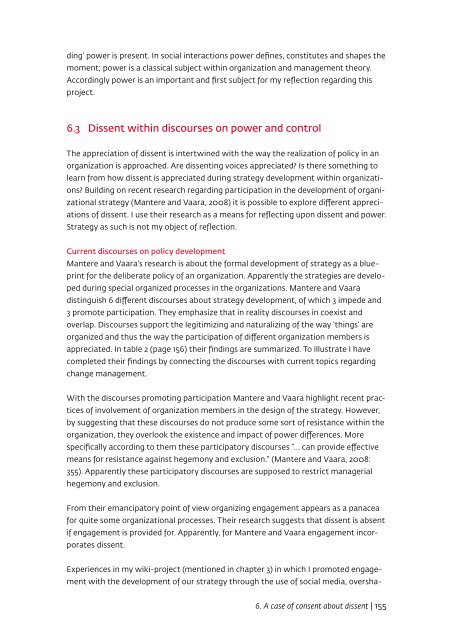Rumbling on performativity_Frits Simon
Rumbling on performativity_Frits Simon
Rumbling on performativity_Frits Simon
Create successful ePaper yourself
Turn your PDF publications into a flip-book with our unique Google optimized e-Paper software.
ding’ power is present. In social interacti<strong>on</strong>s power defines, c<strong>on</strong>stitutes and shapes the<br />
moment; power is a classical subject within organizati<strong>on</strong> and management theory.<br />
Accordingly power is an important and first subject for my reflecti<strong>on</strong> regarding this<br />
project.<br />
6.3 Dissent within discourses <strong>on</strong> power and c<strong>on</strong>trol<br />
The appreciati<strong>on</strong> of dissent is intertwined with the way the realizati<strong>on</strong> of policy in an<br />
organizati<strong>on</strong> is approached. Are dissenting voices appreciated? Is there something to<br />
learn from how dissent is appreciated during strategy development within organizati<strong>on</strong>s?<br />
Building <strong>on</strong> recent research regarding participati<strong>on</strong> in the development of organizati<strong>on</strong>al<br />
strategy (Mantere and Vaara, 2008) it is possible to explore different appreciati<strong>on</strong>s<br />
of dissent. I use their research as a means for reflecting up<strong>on</strong> dissent and power.<br />
Strategy as such is not my object of reflecti<strong>on</strong>.<br />
Current discourses <strong>on</strong> policy development<br />
Mantere and Vaara’s research is about the formal development of strategy as a blueprint<br />
for the deliberate policy of an organizati<strong>on</strong>. Apparently the strategies are developed<br />
during special organized processes in the organizati<strong>on</strong>s. Mantere and Vaara<br />
distinguish 6 different discourses about strategy development, of which 3 impede and<br />
3 promote participati<strong>on</strong>. They emphasize that in reality discourses in coexist and<br />
overlap. Discourses support the legitimizing and naturalizing of the way ‘things’ are<br />
organized and thus the way the participati<strong>on</strong> of different organizati<strong>on</strong> members is<br />
appreciated. In table 2 (page 156) their findings are summarized. To illustrate I have<br />
completed their findings by c<strong>on</strong>necting the discourses with current topics regarding<br />
change management.<br />
With the discourses promoting participati<strong>on</strong> Mantere and Vaara highlight recent practices<br />
of involvement of organizati<strong>on</strong> members in the design of the strategy. However,<br />
by suggesting that these discourses do not produce some sort of resistance within the<br />
organizati<strong>on</strong>, they overlook the existence and impact of power differences. More<br />
specifically according to them these participatory discourses “… can provide effective<br />
means for resistance against hegem<strong>on</strong>y and exclusi<strong>on</strong>.” (Mantere and Vaara, 2008:<br />
355). Apparently these participatory discourses are supposed to restrict managerial<br />
hegem<strong>on</strong>y and exclusi<strong>on</strong>.<br />
From their emancipatory point of view organizing engagement appears as a panacea<br />
for quite some organizati<strong>on</strong>al processes. Their research suggests that dissent is absent<br />
if engagement is provided for. Apparently, for Mantere and Vaara engagement incorporates<br />
dissent.<br />
Experiences in my wiki-project (menti<strong>on</strong>ed in chapter 3) in which I promoted engagement<br />
with the development of our strategy through the use of social media, oversha-<br />
6. A case of c<strong>on</strong>sent about dissent | 155



